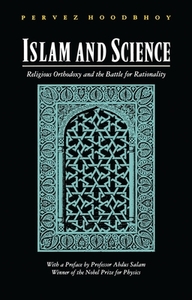Take a photo of a barcode or cover
I think this is a great introductory text that situates readers in the contemporary landscape of modern, scientific education in Muslim countries.
Dr. Hoodbhoy outlines the development of scientific thought in pre-medieval Islam, the Islamic Golden Age, and the subsequent degeneration of the scientific spirit in the late medieval period (while Europe was undergoing the Renaissance) as a result of the political strengthening of orthodox religious factions. He also dispels crude Orientalist (a la Weber) attempts to explain away the relative scientific weakness of Islamic countries as a consequence of the inferiority of Islamic values, and instead suggests that capitalist formations were more prevalent in Europe because of a more tyrannical (not using that word in a bad way, just more 'absolute') religious order could impose legal frameworks more uniformly across the continent. Comparitively, Islam doesn't have a highly centralized political center (like Rome) nor a highly developed priestly class that could exercise political authority; instead, Islam fragmented into many schools of thought (which still exist today), which did not provide the necessary legal substrate (with abstractions such as contracts, land ownership rights, etc.) on which a stable bourgeoise class could develop.
Admittedly, I'm biased: I regard Dr. Hoodhboy highly, for his contributions to nuclear physics and engineering, his steadfast commitment to educating Pakistani youth in science (and just as importantly, in scientific temperament), as well as his humanist ideals.
Short book, can polish it off in a day.
Dr. Hoodbhoy outlines the development of scientific thought in pre-medieval Islam, the Islamic Golden Age, and the subsequent degeneration of the scientific spirit in the late medieval period (while Europe was undergoing the Renaissance) as a result of the political strengthening of orthodox religious factions. He also dispels crude Orientalist (a la Weber) attempts to explain away the relative scientific weakness of Islamic countries as a consequence of the inferiority of Islamic values, and instead suggests that capitalist formations were more prevalent in Europe because of a more tyrannical (not using that word in a bad way, just more 'absolute') religious order could impose legal frameworks more uniformly across the continent. Comparitively, Islam doesn't have a highly centralized political center (like Rome) nor a highly developed priestly class that could exercise political authority; instead, Islam fragmented into many schools of thought (which still exist today), which did not provide the necessary legal substrate (with abstractions such as contracts, land ownership rights, etc.) on which a stable bourgeoise class could develop.
Admittedly, I'm biased: I regard Dr. Hoodhboy highly, for his contributions to nuclear physics and engineering, his steadfast commitment to educating Pakistani youth in science (and just as importantly, in scientific temperament), as well as his humanist ideals.
Short book, can polish it off in a day.
A must read book to understand why Science in Muslim countries has not been able to flourish. Dr Pervaiz Hoodbhoy analyses the various historical personalities and factors which lead to absolute condemnation of Islamic golden age scientists. I particularly loved the end of the book where he shares his experience of wannabe 'scientists' presenting the most absurd papers on 'Islamic science' in the late 80's Islamic science conference in Islamabad. The sad part is that those BS concepts are still prevalent in common household conversations after 3 damn decades. It shows that he was absolutely right in being worried at this clownish attempt to redefine science and shows how damaging it has been for the future generations. If only more people could in Pakistan could think like the professor....
